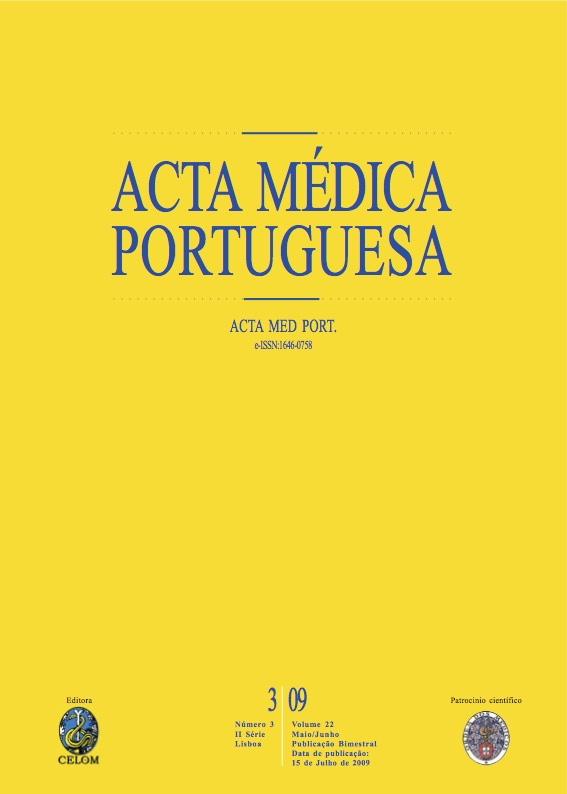Carcinoma colorectal familiar de tipo X: caracterização clínica, patológica e molecular.
DOI:
https://doi.org/10.20344/amp.1705Resumo
Some families fulfilling the Amsterdam Criteria (AC) differ from the Lynch syndrome (LS) in that colorectal cancers (CRC) do not present microsatellite instability (MSI) and DNA mismatch repair gene mutations are not found. These families have been designated as Familial Colorectal Cancer type X (XS) and their genetic basis remains unknown.In families fulfilling AC for LS: 1) To perform MSI testing in CRC and to correlate it with clinical and pathological characteristics and with the mutational analysis in the DNA mismatch repair genes; 2) In cases suggestive of XS, to study the suppressor pathway (SP) of carcinogenesis.45 patients with CRC, from 41 families fulfilling AC, were included. Clinical and pathological data were recorded. MSI testing was performed with the Bethesda marker panel and mutational analysis in MLH1, MSH2 and MSH6 genes was undertaken by DGGE, MLPA and direct sequencing. To study the SP, loss of heterozigoty was evaluated at the following loci: APC, p53, DCC and SMAD4 genes.33/41 (80%) and 8/41 (20%) families presented high-grade microsatellite instability (MSI-H) and microsatellite stable (MSS) CRC, respectively. In families suggestive of XS, a smaller number of CRC and less frequent spectrum associated tumors were detected. In comparison with MSI-H CRC, MSS CRC were preferentially located at the distal colon/rectum and less often presented mucous production or lymphocytic infiltrate. In 70% of families with MSI-H CRC, a pathogenic mutation in one of the DNA mismatch repair genes was identified, as opposed to none in the group with MSS CRC. The SP was followed in 2 cases and an alternative one in other two. The remaining 4 cases were noninformative; however, 5/8 (63%) presented allelic losses in the APC gene.1) Families fulfilling AC and harbouring MSS CRC presented particular characteristics, which reinforce the existence of a new entity, different from LS; 2) The designation of Familial Colorectal Cancer type X seems appropriate to classify an entity whose CRC follow an unclear carcinogenesis pathway and that presents an unknown genetic basis; 3) The designation of LS should be restricted to families with an identified pathogenic DNA mismatch repair gene mutation.Downloads
Downloads
Como Citar
Edição
Secção
Licença
Todos os artigos publicados na AMP são de acesso aberto e cumprem os requisitos das agências de financiamento ou instituições académicas. Relativamente à utilização por terceiros a AMP rege-se pelos termos da licença Creative Commons ‘Atribuição – Uso Não-Comercial – (CC-BY-NC)’.
É da responsabilidade do autor obter permissão para reproduzir figuras, tabelas, etc., de outras publicações. Após a aceitação de um artigo, os autores serão convidados a preencher uma “Declaração de Responsabilidade Autoral e Partilha de Direitos de Autor “(http://www.actamedicaportuguesa.com/info/AMP-NormasPublicacao.pdf) e a “Declaração de Potenciais Conflitos de Interesse” (http://www.icmje.org/conflicts-of-interest) do ICMJE. Será enviado um e-mail ao autor correspondente, confirmando a receção do manuscrito.
Após a publicação, os autores ficam autorizados a disponibilizar os seus artigos em repositórios das suas instituições de origem, desde que mencionem sempre onde foram publicados e de acordo com a licença Creative Commons









